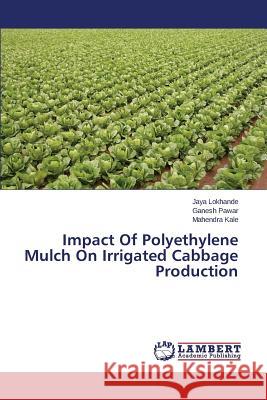Impact Of Polyethylene Mulch On Irrigated Cabbage Production » książka
Impact Of Polyethylene Mulch On Irrigated Cabbage Production
ISBN-13: 9783659275319 / Angielski / Miękka / 2015 / 72 str.
The field experiment framed in randomized block designed having six treatments with four replications was conducted on cabbage at research farm of Irrigation and Drainage Engineering, Dr. PDKV, Akola for its response to different irrigation/mulch treatments on water saving during November 2013 to February 2014. Seasonal water requirement of cabbage was found to be highest (327.4 mm) under irrigation scheduling at 100% ETc (T4, T5, and T6). It was found to be lowest (252.2 mm) under irrigation scheduling at 50% moisture depletion of available water capacity under silver polyethylene mulch with drip irrigation. The highest saving of water over control treatment was achieved in T2 (drip + silver mulch, irrigation at 50% of AWC) (22.97%), followed by T1 (14.91%) and T3 (6.84%). The treatments with irrigation at 50% depletion of AWC resulted in less yield as compare to treatments with irrigation equal to 100% evapotranspiration. No specific pattern of yield in response to water/mulch is observed. Treatment T2 (drip + silver mulch, irrigation at 50% of AWC) recorded highest water use efficiency followed by treatment T6 (control), T5, T4, T1 and T3.
The field experiment framed in randomized block designed having six treatments with four replications was conducted on cabbage at research farm of Irrigation and Drainage Engineering, Dr. PDKV, Akola for its response to different irrigation/mulch treatments on water saving during November 2013 to February 2014. Seasonal water requirement of cabbage was found to be highest (327.4 mm) under irrigation scheduling at 100% ETc (T4, T5, and T6). It was found to be lowest (252.2 mm) under irrigation scheduling at 50% moisture depletion of available water capacity under silver polyethylene mulch with drip irrigation. The highest saving of water over control treatment was achieved in T2 (drip + silver mulch, irrigation at 50% of AWC) (22.97%), followed by T1 (14.91%) and T3 (6.84%). The treatments with irrigation at 50% depletion of AWC resulted in less yield as compare to treatments with irrigation equal to 100% evapotranspiration. No specific pattern of yield in response to water/mulch is observed. Treatment T2 (drip + silver mulch, irrigation at 50% of AWC) recorded highest water use efficiency followed by treatment T6 (control), T5, T4, T1 and T3.











